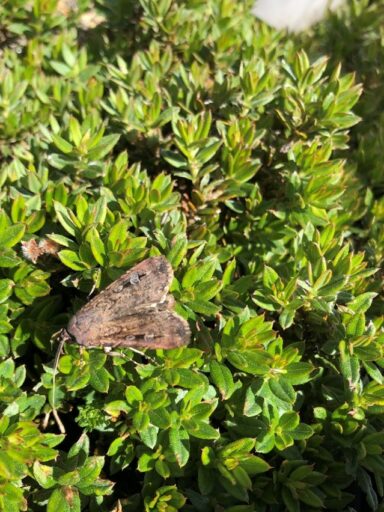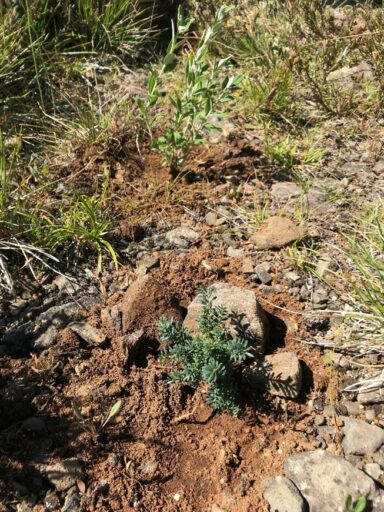Mountain Pygmy-possum Project finishes on a high
“It’s a possum!”
The excited call came as Falls Creek Alpine Resort staff were recently checking the images recorded on pest animal monitoring cameras.
The slightly blurry photo of a Mountain Pygmy-possum sitting on top of a rock in front of the monitoring camera is certainly not going to win any photography awards but is still one of the most amazing photos captured by these cameras.

The pest animal monitoring cameras were first installed over four years ago by Falls Creek staff near crucial Mountain Pygmy-possum habitat as part of the Mountain Pygmy-possum Recovery Project. Since then, the images captured by these cameras are regularly checked by the Falls Creek Alpine Resort Environment team to assist with the planning and control of pest animals that, if left unchecked, can impact local Mountain Pygmy-possums.
“The animal monitoring cameras positioned within the Mountain Pygmy-possum habitat usually capture pest animals including feral cats, foxes, rabbits, hares, and Sambar deer”, explained Naomi Monk, who is the Environmental Officer currently leading this project within the Falls Creek Alpine Resort. “It is always exciting when we see native species, which also live within this habitat, on these pest monitoring cameras, including the very cute threatened Broad-toothed Rat and native birds such as the Australasian Pipit. Until now we hadn’t ever seen a Mountain Pygmy-possum on the cameras as they are usually hidden amongst the rocks or vegetation.”
The possum photo was captured during one of the most successful population monitoring seasons for the Resort since historical fires damaged large parts of the Mountain Pygmy-possum habitat. Dean Heinze is the wildlife biologist from Ecology Links who has been monitoring the Mountain Pygmy-possums within Falls Creek Alpine Resort, “The 2003 bushfires, in combination with those of 2006/2007, severely altered the habitat for Mountain Pygmy-possums in the Mt McKay area. Whilst the core habitat for other Mountain Pygmy-possum populations in Victoria is centered on boulderfields, at Mt McKay the core habitat pre-fire was centered on rocky outcrops surrounded by thick heathland which created high levels of protective cover. This was almost all burnt in 2003 coinciding with a crash in the Mountain Pygmy-possum population to low points in 2016-2019 when no individuals were encountered during the Falls Creek Alpine Resort annual monitoring program. In recent years numbers have improved, including in 2022/2023 when eight adult females (each with signs of breeding) were encountered - the highest number since 2005”. This increase in numbers is likely due to improvements in vegetation recovery, habitat improvement, and a reduction in pest predators which has been a focus following the fires.


Whilst the known key Mountain Pygmy-possum habitat areas are protected, the entire alpine landscape is important for conservation efforts as Mountain Pygmy-possums have been documented to travel many kilometres in a night. For this reason, Naomi explained that “There are numerous pest animal monitoring cameras used in the landscape to inform our planning and control efforts to help keep dispersing individuals safe from feral cats and foxes”. Dean added that there is a “Need for true integrated introduced predator control in habitat fragmented landscapes and even more so when this fragmentation is further exacerbated by fire impacts”.
Falls Creek Alpine Resort and Dean Heinze are members of the Victorian Mountain Pygmy-possum Recovery Team that collaborates and shares knowledge with other partners who are also involved in working to protect the Mountain Pygmy-possum. As part of this collaboration, Naomi and Dean have been working together to prioritise works that will benefit the Falls Creek possum populations. Works undertaken in recent years as part of the recovery project have included revegetation in and around previously burnt possum habitat using food source plants, and those that provide connective cover from predators, along with control of feral cats and foxes. These project works have been further supported by other priority activities supported by Falls Creek Alpine Resort. The Resort has an annual monitoring program to detect any variation in the relative abundance of the arrival of migrating Bogong moths, which is an important food source for breeding possums.
Over the past few summers, the resort has been busy planting hundreds of additional plants including the mountain plum pine (Podocarpus lawrencei) into historically damaged Mountain Pygmy-possum habitat with the help of the Zoos Victoria’s Totes for Wildlife program. Additionally, more plants that provide food for the possums including the mountain plum pine, tall rice flower (Pimelea ligustrina) and daisy bushes (Olearia spp.) are to be planted this year in a project that received support through funding from the Australian Government, to deliver re vegetation to historically damaged habitat and help to establish a framework for monitoring Mountain Pygmy-possum food sources.
Whilst it is uncertain as to why possum numbers at the population at Mt McKay dropped so low during 2016-2019 there are numerous possible threats that can be addressed to help mitigate the environmental changes being faced by these populations. The ongoing efforts of Falls Creek Alpine Resort in collaboration with experts such as Dean Heinze and landscape project partners has made great progress in improving habitat and the chances for survival of our Mountain Pygmy-possums. Naomi reflected on the success of this project and supporting activities, “At Falls Creek it is hoped that we can continue to keep feral cats and foxes in low numbers near possum habitat, continue to better understand and manage food source plants and invertebrates for the possums, and be aware of other potential threats to local population numbers”.
With all the Victorian Recovery Team partners working towards the same goal, this project has improved habitat areas for the Mountain Pygmy-possums. As Naomi explained, “these threats will continue, and we aim to apply our learnings from this project to hopefully maintain increasing population trends for Mountain Pygmy-possum populations into the future.”
The Mountain Pygmy-possum Recovery Project is supported by project partners North East CMA, Parks Victoria, Mount Hotham Alpine Resort, Falls Creek Alpine Resort, Department of Energy, Environment and Climate Action, Traditional Owners and Zoos Victoria, through funding from the Australian Government’s National Landcare Program.

